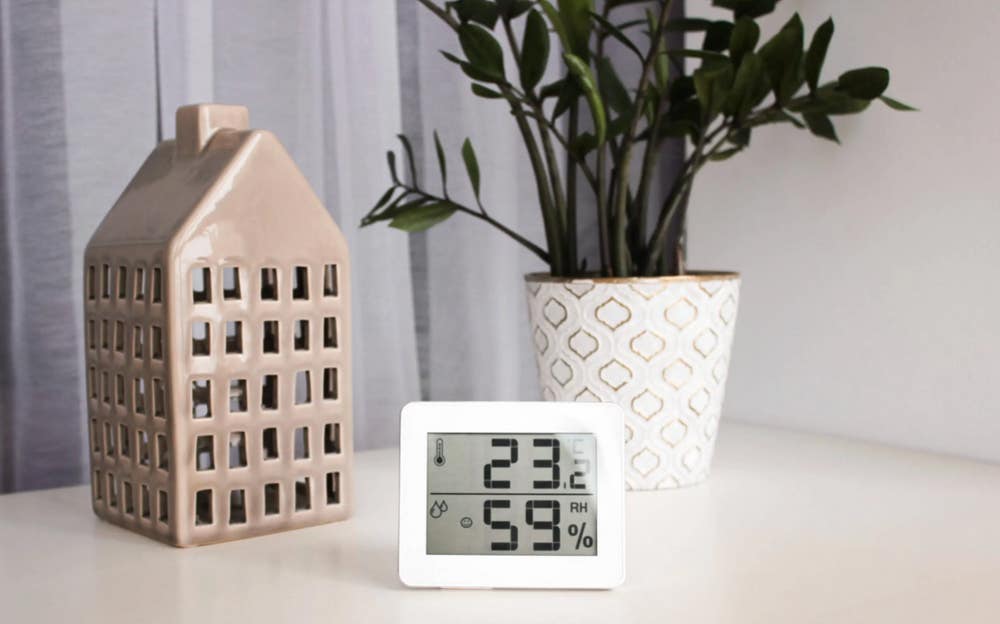Cut your energy bills in half with groundbreaking home climate control technology
New start-up developed a technology capable of utilizing humidity fluctuations to cool and heat buildings at half the current cost.

[Apr. 18, 2023: Staff Writer, The Brighter Side of News]
Imagine if you could heat or cool your home just by plucking the desired comfort level out of the air. (CREDIT: Creative Commons)
A potential solution to the surging energy prices may be found in a newly established startup that has developed a technology capable of utilizing humidity fluctuations to cool and heat buildings at half the current cost.
Picture a scenario where you could simply extract the desired temperature from the air to regulate the comfort level in your home. This notion is no longer a fantasy as ThermoTerra, an Israeli startup, is transforming it into a pioneering renewable energy system that extracts energy from variations in humidity.
Dror Zchori, ThermoTerra's CEO and founder, explains that when water vapor present in the atmosphere is assimilated onto or within an absorptive component, it carries a significant amount of energy.
The process of water evaporation is inherently cooling, and we instinctively understand this. This is evident in the way our bodies function, where sweating helps to regulate temperature by releasing heat as water evaporates from the skin.
Related Stories
However, when water vapor is absorbed or condenses on a surface, the opposite effect occurs, and heat is generated.
ThermoTerra's innovative technology utilizes this principle to provide a cooling effect in buildings. By bringing in warm and dry ambient air on hot days and storing it within the building's walls, which are insulated with materials such as hempcrete, silica gel, or wood wool, humidity is absorbed. When the stored air eventually evaporates, it absorbs energy and cools the building.
When the temperature drops, chilly and damp air enters the area, and as it is taken in, it raises the temperature, providing warmth to homes or offices. According to Zchori, this is a natural occurrence.
ThermoTerra's requirement is unquestionable, with approximately 40% of the world's energy consumption being used for temperature regulation in buildings, and buildings accounting for 30% of the world's energy usage, the need for new technologies like ThermoTerra is evident.
Three components
ThermoTerra operates by integrating a network of ducts and conduits into a newly constructed wall. For already established buildings, a new façade containing built-in insulation and ducts can be incorporated into the existing walls.
Despite requiring a few additional inches, the benefits of reduced environmental impact and financial savings are substantial. According to Zchori, including ThermoTerra technology during a building's construction process can reduce heating and cooling costs by as much as half or even eliminate them altogether in certain instances.
The system incorporates an intelligent fan, mounted onto the wall and operated by algorithms, which efficiently circulates hot or cold air as needed. This single component is the sole electricity-dependent element of the system.
ThermoTerra’s system is composed of three main components:
Storage reservoir – special absorption material packed inside a wall with air channels designed for maximum air flow.
A system of fans, ducts and dampers.
ActiveMemBrain consisting of IoT smart sensors, the controller, algorithms and cloud computing.
ThermoTerra employs unique water-absorbing materials and a proprietary control system to harness humidity changes. This process charges the insulation material, enabling it to become drier during the winter and damper during the summer. ThermoTerra then leverages this process to regulate the temperature by forcing air through the material, releasing hot or cold air as needed.
ThermoTerra's technology can be implemented in many forms. (CREDIT: ThermoTerra)
ThermoTerra's system continually passes ambient air through the insulation material to create a more balanced environment. This process reduces the severity of temperature and humidity fluctuations, resulting in a more comfortable indoor climate.
A real impact
ThermoTerra, headquartered in Amirim, a rural Galilee community, was founded by Zchori. His idea for ThermoTerra was inspired by his own experience building a green home in the same community known for its environmental awareness. Zchori utilized all the technology he knew to make a zero-energy home, but the result was a house that was completely off the grid and without any wood or other energy. Consequently, he experienced coldness during the winter.
ThermoTerra's patented technology harnesses energy from fluctuations in humidity. (CREDIT: ThermoTerra)
According to Zchori, “I built a zero-energy home by incorporating all the technology I knew, but the house was completely off the grid, and I didn't use any wood or any other energy. I was left feeling cold during winter.” ThermoTerra, now headquartered in Amirim, a rural Galilee community known for its environmental consciousness, was conceived by Zchori while constructing his green home.
Due to his expertise in biotechnology, agriculture, mechanical engineering, and green construction, Zchori came to the realization that humidity cooling and heating could be achieved with easily available materials rather than complex and rare elements that require importation.
Zchori illustrates that various materials can absorb humidity and regain flexibility. For instance, leaving a newspaper under the sun will make it dry and brittle, but placing it in a damp room will enable it to absorb humidity and become flexible again.
The principle of utilizing humidity to regulate temperature is prevalent in various materials. Traditional buildings made of mud and clay are excellent at retaining heat and keeping the cold out by utilizing humidity.
By capitalizing on the natural fluctuations in humidity, Zchori discovered that he could raise the temperature in his house from 12 degrees Celsius (53.6 Fahrenheit) to 26 C (78.8 F).
Zchori admits that his house was not the ideal proof-of-concept, stating, "It's a unique house. I wanted to demonstrate that our methodology could be used on more typical structures, where it could make a genuine difference."
A change in the world
In 2015, ThermoTerra was established by Zchori, along with patent attorney Jeremy Rutman and data analysis expert Yonatan Nathan. The company currently employs a team of five individuals.
The company's funding has been derived from multiple sources, including the Israeli Ministry of Energy, the Israel Innovation Authority, and the founders themselves. Additionally, ThermoTerra has applied for a research grant from the EU.
ThermoTerra has received financial support from the Quantum Hub accelerator, which is sponsored by Tadiran, an Israeli air conditioning manufacturer. Zchori explains that the team has collaborated with Tadiran's engineers to address their humidity issues and to reduce energy consumption.
The ThermoTerra team is dedicated and enthusiastic about their work. Zchori recalls an early encounter with a skilled programmer who was willing to work without pay. The programmer had previously worked for a credit card company, developing AI that encouraged people to spend more. However, they desired to contribute to a greater cause and make a positive impact in the world.
Overall, ThermoTerra is an innovative company that is passionate about reducing energy consumption and making a difference in the world.
Harnessing humidity
ThermoTerra anticipates that implementing a humidity fluctuation heating and cooling system in a 100-square-meter private home will cost roughly $3,400. This cost includes added-value services such as smoke and gas leak detection, as well as indoor air pollution monitoring and filtering.
While ThermoTerra will not design its own insulation, it plans to collaborate with contractors to construct the passive part of the system. Currently, the company is seeking such a collaboration, as it is in the midst of product development and conducting experiments in various parts of Israel.
In the future, ThermoTerra hopes to expand its services to include cooling systems for cars. Specifically, the company envisions using evaporative water harvested overnight to cool down cars that have been sitting in the sun and have become overheated.
Cooling and heating are fundamental needs regardless of location, whether it's a car, home, or any other place. Zchori acknowledges the significance of these needs and aims to empower individuals by enabling them to make their homes self-sufficient in terms of cooling and heating.
Note: Materials provided above by The Brighter Side of News. Content may be edited for style and length.
Like these kind of feel good stories? Get the Brighter Side of News' newsletter.
Joseph Shavit
Head Science News Writer | Communicating Innovation & Discovery
Based in Los Angeles, Joseph Shavit is an accomplished science journalist, head science news writer and co-founder at The Brighter Side of News, where he translates cutting-edge discoveries into compelling stories for a broad audience. With a strong background spanning science, business, product management, media leadership, and entrepreneurship, Joseph brings a unique perspective to science communication. His expertise allows him to uncover the intersection of technological advancements and market potential, shedding light on how groundbreaking research evolves into transformative products and industries.



